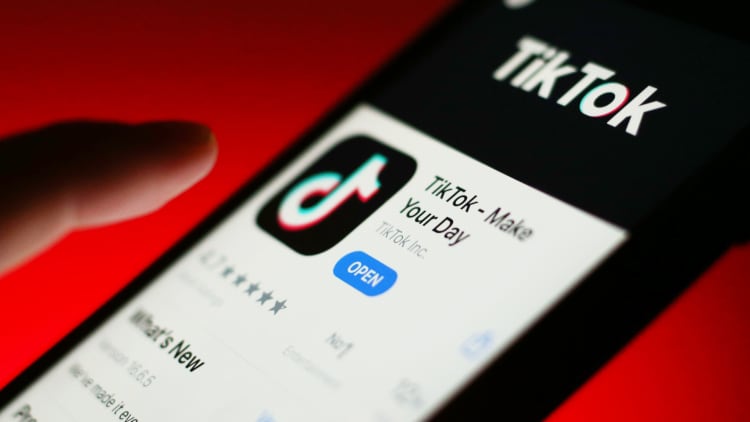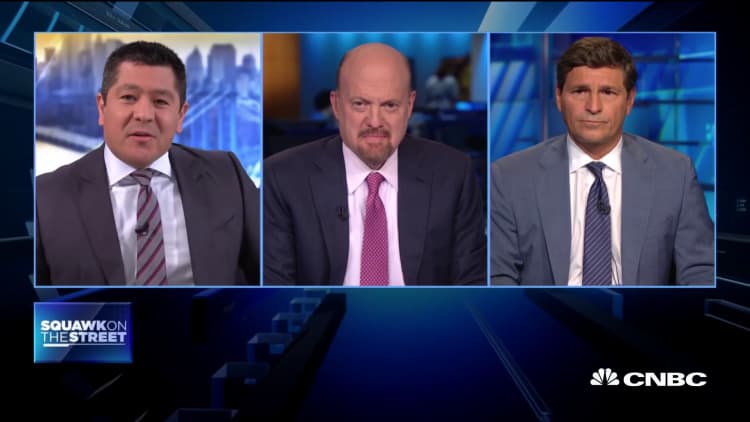
President Donald Trump on Thursday issued executive orders banning U.S. transactions with Chinese tech firms Tencent and ByteDance.
Tencent owns Chinese messaging app WeChat, and ByteDance is the Beijing-based parent company of the widely popular short video-sharing app TikTok.
The ban will take effect in 45 days and may attract retaliation from Beijing.
While the scope of the ban remains unclear, the executive orders said that after 45 days, Secretary of Commerce Wilbur Ross "shall identify the transactions" that will be subjected to the prohibition.
China's foreign ministry on Friday said at a media briefing that it firmly opposed the executive orders, Reuters reported. Beijing will defend the legitimate rights and interests of Chinese businesses, according to foreign ministry spokesman Wang Wenbin, the news wire added.
WeChat "automatically captures vast swaths of information from its users. This data collection threatens to allow the Chinese Communist Party access to Americans' personal and proprietary information," Trump said in the executive order banning the app, adding that the application also captures personal information of Chinese nationals visiting the U.S.
The US actions against TikTok and WeChat could be a turning point in Beijing's calculus around how to respond to the US policy actions...Eurasia Group
The order would basically ban the app in the United States as it prohibits "any transaction that is related to WeChat by any person, or with respect to any property, subject to the jurisdiction of the United States, with Tencent Holdings Ltd."
Tencent shares in Hong Kong tumbled 5.04% on Friday.
A similar order was issued for TikTok and its Beijing-based owner, ByteDance.
The popular app "may also be used for disinformation campaigns that benefit the Chinese Communist Party," Trump said in the executive order banning the video-sharing app. "The United States must take aggressive action against the owners of TikTok to protect our national security."
TikTok has consistently denied those allegations. It says that U.S. user data is stored in the country itself with a backup in Singapore, and that its data centers are located outside China, implying the information was not subjected to Chinese law.
Still, experts have pointed to existing legislation in China which could force local Chinese companies like ByteDance and others to hand over data to Beijing.
Microsoft announced Sunday that it was in talks with ByteDance to acquire TikTok's business in the U.S., Canada, Australia and New Zealand within the next three weeks, ahead of a Sept. 15 deadline.
In a statement, TikTok said it was "shocked" by the executive order and said it was "issued without any due process.
"For nearly a year, we have sought to engage with the US government in good faith to provide a constructive solution to the concerns that have been expressed. What we encountered instead was that the Administration paid no attention to facts, dictated terms of an agreement without going through standard legal processes, and tried to insert itself into negotiations between private businesses," TikTok said in its statement.
Read TikTok's full statement here.
Tencent did not immediately respond to CNBC's request for comment.

The moves came after U.S. Secretary of State Mike Pompeo said the Trump administration wants to see "untrusted" Chinese apps like WeChat and TikTok removed from U.S. app stores. He detailed a new five-pronged "Clean Network" effort aimed at curbing potential national security risks and said because those apps have parent companies based in China, there was "significant threats to personal data of American citizens, not to mention tools for Chinese Communist Party content censorship."
Pompeo also said the State Department would work with other government agencies to limit the ability of Chinese cloud service providers to collect, store and process data in the U.S.
'Major escalation' between U.S. and China
The latest moves represent another step in the deteriorating relations between the world's two largest economies.
"The executive orders represent a major escalation on the US side of the confrontation with China over the use of technology and mark the first time the US government has attempted to ban a software application running on millions of mobile phones within the US," according to analysts at political risk consultancy Eurasia Group.
While the move puts pressure on ByteDance to sell TikTok to Microsoft or other U.S. companies within the 45-day window, the implications for WeChat and Tencent could be broader depending on guidance from the Trump administration, Eurasia Group analysts said.
"The US actions against TikTok and WeChat could be a turning point in Beijing's calculus around how to respond to the US policy actions that have now either impacted or threatened to impact all of China's national tech champions," the analysts wrote.
"The strident tone of some editorials in state backed media in recent days suggests pressure is mounting for Beijing to take steps like rolling out the much talked about but not yet implemented unreliable entities list to target the operations of US technology companies in China," they added.
Recently, the U.S. closed the Chinese consulate in Houston, which prompted China to do the same for the U.S. consulate in Chengdu.
— CNBC's Amanda Macias contributed to this report.



